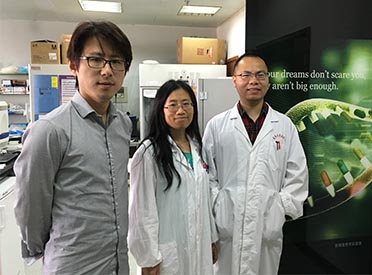Human genome has more than 20 thousands of protein coding genes, however, the coding sequences only count for a very small portion of the genome. Over the last twenty years, scientists found the non-coding sequences contain many important regulatory elements, such as enhancers, promoters and non-coding RNAs. These non-coding sequences, although don't produce protein products, are important in controlling gene activities. Scientists call these regulatory mechanisms, epigenetics. Among many epigenetics mechanisms, modifications, such as methylation and acetylation, on histone proteins are one of the research hotspots, as they play crucial roles in regulating epigenetics environment.
After 5 years of collaboration, Lan laboratory and Shi laboratory from the Institutes of Biomedical Sciences (IBS) in Fudan university, have identified a novel epigenetics mechanism controlling enhancer function through regulating histone methylation. In this study, Postdoc Hongjie Shen and PhD student Wenqi Xu discovered a previously unknown overactive state of enhancers. The histone proteins with the overactivated enhancers are modified with H3 lysine 4 trimethylation (H3K4me3) and H3 lysine 27 acetylation (H3K27Ac). They also found that two proteins RACK7 and KDM5C are in charge of the suppression of such overactive state. Mechanistically, RACK7 “drags” KDM5C to overactivated enhancers and then KDM5C removes two methyl groups from H3 lysine 4 site resulting in a monomethylated H3 lysine 4 (H3K4me1). Once the enhancers go back to H3K4me1 status, their activities become normal.
The regulation is very important in preventing enhancers and their target genes from overactivating. As many oncogenes are subjected to the regulation of enhancers, once the enhancers become overly activated, their target oncogenes will make too many oncoproteins and cells become tumorigenic. Dr. Lan commented that “RACK7 and KDM5C are ‘enhancer brakes’, once the brakes are mutated in cancer, the normal cells will transform to cancer cells due to the overload of oncoproteins. It will be important for researchers to develop targeted medicines to precisely control enhance activities, many cancer patients will be benefited if we know how to turn on and turn off enhancers.”

